World
The Plight of Maria Kalesnikava: A Call for Freedom and Justice in Belarus
Explore the harrowing story of Maria Kalesnikava, a symbol of resistance in Belarus. This article delves into her struggle for freedom and justice, shedding light on the broader fight against oppression in her homeland.
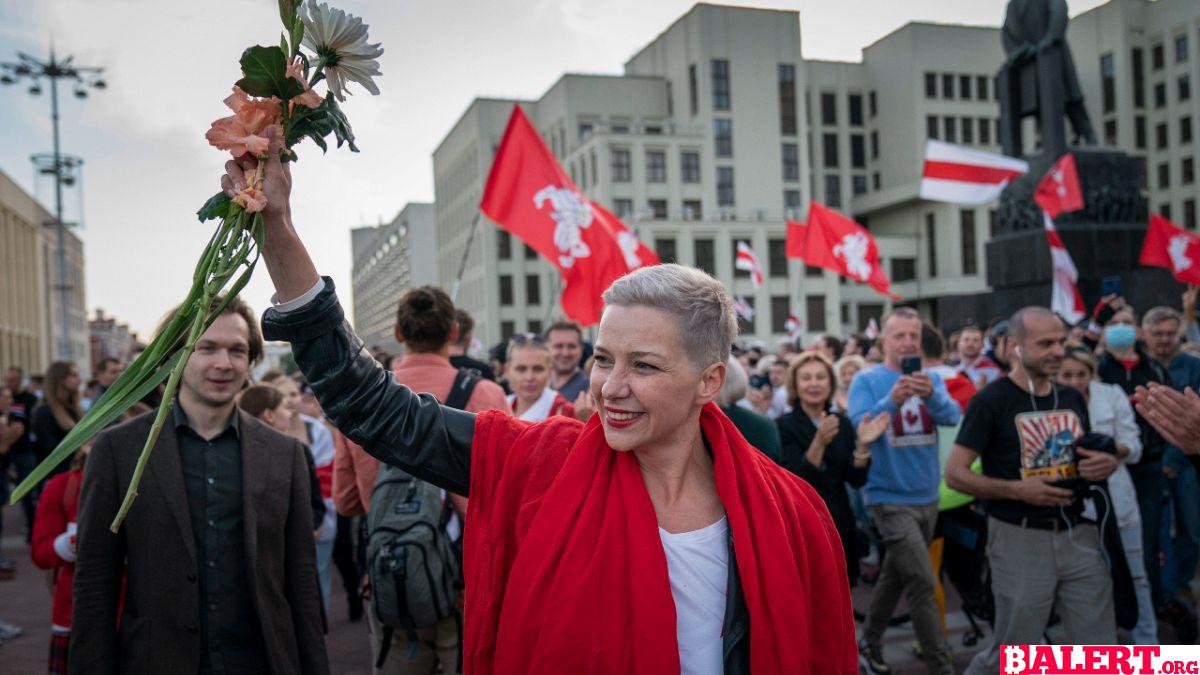
The Struggle of Maria Kalesnikava: A Fight for Freedom
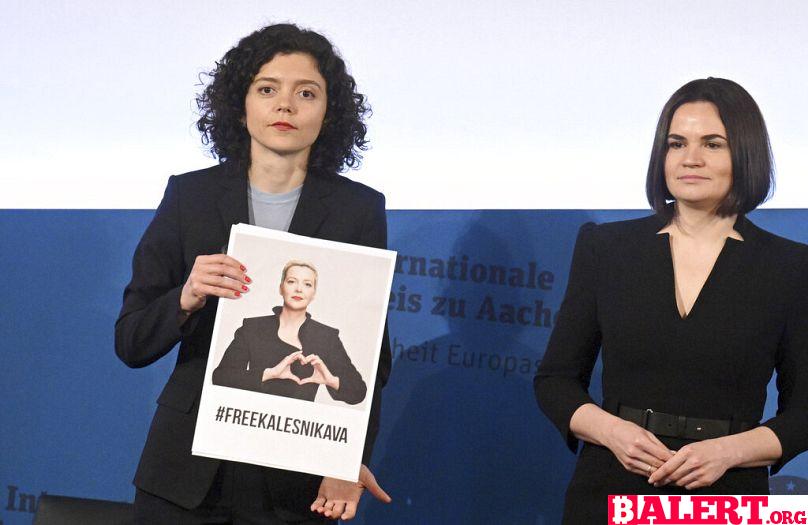
The striking figure of Maria Kalesnikava, with her red lips, white hair, and leather jacket, evokes memories of a punkish Marilyn Monroe in vintage photographs. Instead of seeking fame over a subway grate, this Belarusian-born flautist and political activist made a name for herself both in orchestras abroad and on the frontlines of protests back home, where she fought ardently for fair and democratic elections in her native Belarus. However, her younger sister, Tatsiana Khomich, recently shared with Euronews the heartbreaking reality faced by Kalesnikava in Correctional Colony No. 4 in Gomel. The guards at the facility have attempted to convince her that she has been forgotten — that her story has faded from public consciousness. “When Maria inquired, ‘Where are my letters? Where are my communications and packages and phone calls?’ she was told, ‘Everyone has forgotten about you,’” Khomich recounted with anguish. “It is crucial that we spread the word about Maria, to share the truth about her conditions, and to highlight that she is enduring hunger in the heart of Europe.”
Life Before Detention
In 2020, Kalesnikava was already a celebrated flautist in both Belarus and Germany when she took the helm of the campaign for Viktar Babaryka, the presumed opposition leader. Tragically, Babaryka, a former banker and philanthropist, was arrested before he could officially challenge the long-standing authoritarian president, Alexander Lukashenko, in the controversial presidential elections. The autocrat’s sixth term, now extending over three decades, ignited violent protests and a ruthless crackdown on political opposition, resulting in the arrest of an estimated 35,000 individuals. Many, including European Commissioner for Justice Didier Reynders, condemned the elections as fraudulent and demanded the immediate release of those who had been detained.
Currently, Babaryka, Kalesnikava, and approximately 1,400 other political prisoners remain imprisoned in Belarusian penal colonies and prisons in the aftermath of these elections. According to a report by the UN High Commissioner for Human Rights published in April, Belarusian detention centers are rife with human rights violations, including torture and gender-based violence. Reports indicate that Babaryka was hospitalized due to the severe beatings he endured. The EU diplomatic service EEAS expressed concern over his deteriorating health and reiterated calls for the release of all political prisoners, including Babaryka. It has been four years since Kalesnikava was arrested and sentenced on charges that over 20 human rights organizations have denounced as “bogus.” While the focus may be on Babaryka, Khomich is steadfast in advocating for her sister.
Kalesnikava’s Situation Worsens
During her four years of detention in Gomel, Amnesty International has alleged that Kalesnikava has been “ill-treated” by the penal colony administration, leading to a deterioration of her health. Khomich recounted that she observed this decline during their monitored 10-minute video calls, which occur every two months. “In one video call, she appeared strong, but there were subtle changes in her demeanor,” Khomich, a former business analyst who has become a full-time human rights advocate, noted. “Maria has lost significant weight; she now weighs only 45 kilograms, having lost at least 20 kilograms since her arrest.”
However, communication was severed when Kalesnikava was transferred to a “punishment-type cell” in mid-March. The Minsk-based Viasna Human Rights Centre reports that those confined in these cold, dark rooms are permitted only basic necessities—such as a toothbrush and a bar of soap—and are subjected to total solitary confinement. “Conditions in the punishment cell are extremely harsh and can be classified as torture,” Viasna stated online. Khomich revealed that her sister is prohibited from reading books, accessing news, or communicating with her family or lawyer. Her daily exercise is limited to 30-minute walks in a “small” enclosed area. “There is no sunlight or sky visible,” Khomich explained. The only updates Khomich receives about her sister’s condition come from whispers relayed by recently released inmates scattered across Europe.
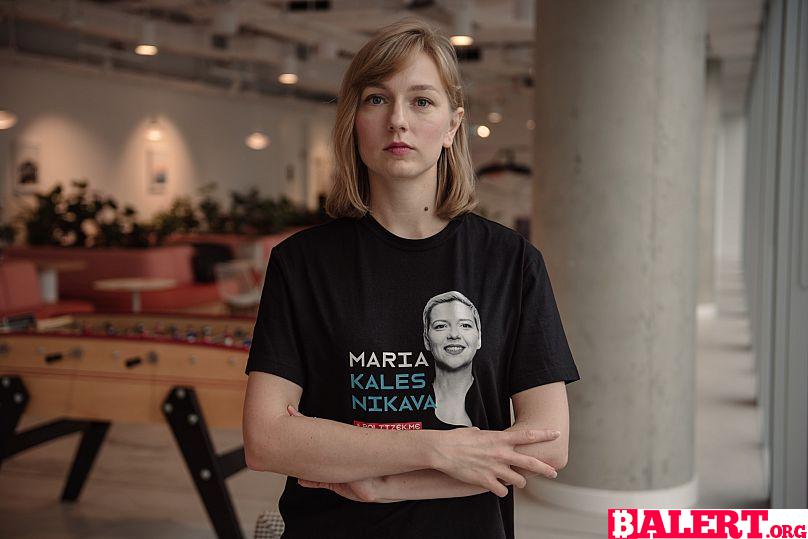
What’s Next?
Khomich’s connection to music has been irrevocably altered by her sister’s 11-year prison sentence. Each time she attends a concert featuring a flute ensemble, she is overwhelmed with emotion, as it reminds her of Kalesnikava. “It is painful,” she confessed. Yet, rather than succumbing to despair, Khomich has channeled her emotions into advocating for Kalesnikava’s release. She believes that exerting pressure on European countries and leaders to negotiate prisoner swaps—either publicly or discreetly—could lead to successful outcomes.
Recently, Lukashenko’s pardoning of 30 prisoners convicted for their roles in the 2020 political protests has instilled a sense of optimism in Khomich. “For a long time, it seemed impossible for people to be released from political prisons,” she reflected. “This also gives us hope that the deadlock can be broken and, eventually, Maria will also be released.”
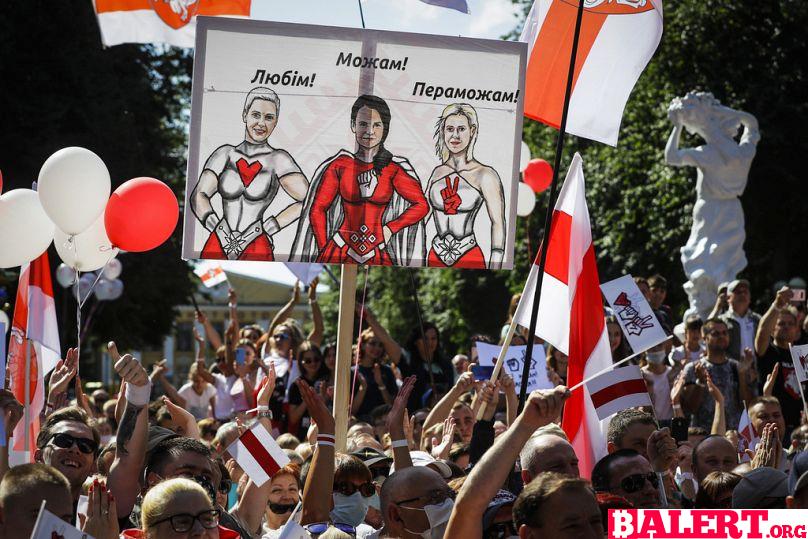
Allies in Other Corners
Inna Kavalionak leads the advocacy platform Politzek, an organization established in 2020 in response to the presidential election and the subsequent repression. The organization’s mission is to ensure that political prisoners are not forgotten while actively lobbying for their release. Kavalionak, a former theater producer turned professional activist, met Kalesnikava in 2018 in Minsk, prior to their political journeys. “She radiated brightness, like the sun entering a room,” Kavalionak recalled. Years later, both women became involved in Babaryka’s campaign, marking the beginning of their activism. Although Kavalionak was detained by national authorities for her participation in the election protests, she was released but later forced to flee Belarus, where she remains today.
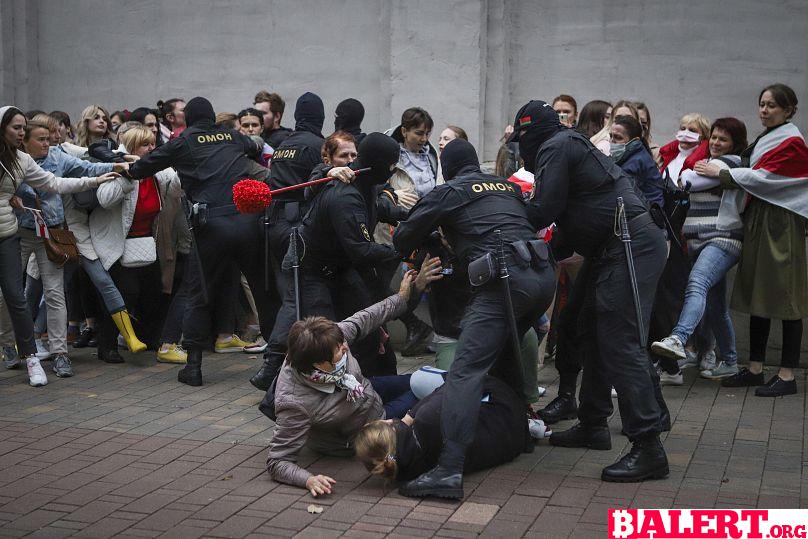
Four years later, Kavalionak feels a profound responsibility to advocate for those who remain imprisoned. “Their suffering is already evident in the colonies. Our focus should be on the people,” she asserted. Despite the EU, the US, and other Western allies refusing to recognize Lukashenko as the legitimate president, the Belarusian leader, dubbed “Europe’s last dictator,” has declared his intention to run for another term in the 2025 presidential elections. In February, the 70-year-old stated that he would “do it the way it should be done” for the eastern European nation.
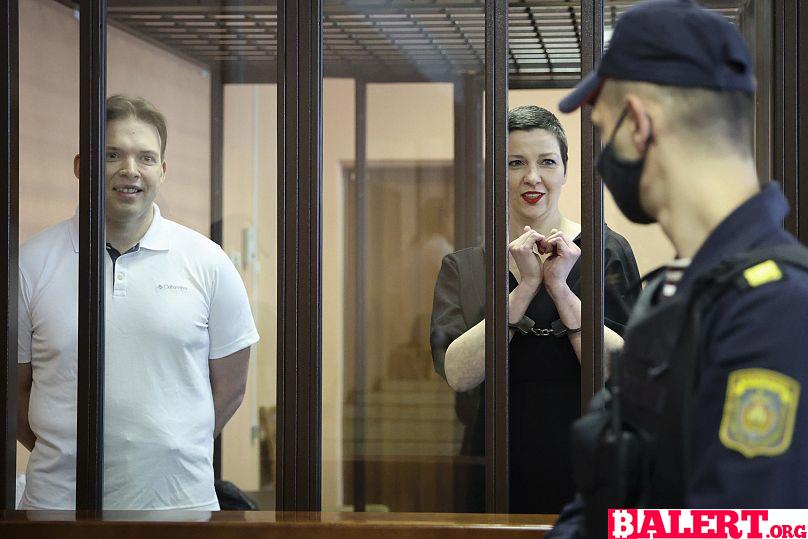
Even if the prospects of democracy seem bleak—with staunch opposition figures like Babaryka behind bars and many others either exiled or silenced—Kavalionak emphasized that Belarusians continue to hold onto hope that one day free and fair elections will be held in their country. “Even though there are no protests visible on the streets of Belarus, it does not imply that people are not resisting,” she concluded.
World
Dominique Pelicot Testifies in Harrowing Rape Trial
Join us as Dominique Pelicot courageously testifies in a harrowing rape trial, shedding light on the complexities of trauma and justice. Her powerful story raises crucial questions about the legal system and the importance of support for survivors.

Dominique Pelicot Takes the Stand in Shocking Rape Trial
In a courtroom drama that has captivated France and garnered international attention, Dominique Pelicot, the man at the center of a harrowing rape trial, finally addressed the court. With tears streaming down his face, he recounted how his wife had been instrumental in helping him cope with a tumultuous past marked by trauma. He revealed that he had endured a sexual assault at the tender age of nine while hospitalized, and he also witnessed a gang rape during his teenage years while working as an apprentice electrician on a construction site.
“She didn’t deserve this, I acknowledge that,” Mr. Pelicot stated, his voice barely audible as he struggled to convey his emotions. The gravity of the situation weighed heavily on him, and the courtroom fell silent, straining to catch his every word.
Now 71 years old, Mr. Pelicot faces serious allegations of drugging his wife, Gisèle Pelicot, whom he has been married to for half a century, over a span of nearly ten years. Prosecutors contend that he used drugs to render her comatose, allowing him to rape her repeatedly. Furthermore, authorities allege that he went so far as to invite numerous men into their home, facilitating a nightmarish scenario where they, too, engaged in the assault of his wife.
Overall, 51 men, including Mr. Pelicot, are on trial concurrently, primarily facing charges related to the aggravated rape of Ms. Pelicot. Among them, one individual has already pleaded guilty to similar crimes, admitting to drugging his own wife to assault her and inviting Mr. Pelicot to partake in the horrific act while she was incapacitated.
Mr. Pelicot’s unexpected testimony came after a tumultuous start to the trial. Just a week in, he was stricken with severe health issues that forced him to miss four consecutive days in court. The head judge ultimately decided to postpone proceedings, as Mr. Pelicot was diagnosed with kidney stones, a kidney infection, and prostate complications, adding yet another layer of complexity to this already harrowing case.
World
Meta Bans Russian State Media Outlets from Social Media Platforms
Explore the implications of Meta’s decision to ban Russian state media outlets from its social media platforms. Understand the impact on information dissemination and the ongoing battle against misinformation in the digital landscape.

Meta Imposes Global Ban on Russian State Media Outlets
In a significant move, Meta Platforms, Inc., the parent company of Facebook, has announced the prohibition of Russian state media outlets, including RT (Russia Today) and Rossiya Segodnya, from all its social media platforms. The decision stems from the company’s concerns regarding the deceptive strategies employed by these media organizations to execute covert influence operations across the internet.
Meta made this announcement on Monday, emphasizing that the ban will be enforced worldwide across its various platforms, such as Instagram, WhatsApp, and Threads. The rollout of this ban is expected to take place over the coming days.
Statement from Meta
A spokesperson for Meta elaborated on the decision, stating, “After careful consideration, we have expanded our ongoing enforcement actions against Russian state media outlets. As a result, Rossiya Segodnya, RT, and other affiliated entities are now banned from our applications globally due to their involvement in foreign interference activities.”
For further insights into this development, watch the video in the player above.
World
Trump Recalls Alleged Assassination Attempt While Golfing
Explore Donald Trump’s chilling recollection of an alleged assassination attempt he experienced while enjoying a round of golf. Delve into the tense moments and his reflections on safety, fame, and the unpredictability of public life.

In a recent interview on the social media platform X, Republican presidential nominee Donald Trump recounted a harrowing incident he claims to have experienced while playing golf. Trump described how, during a peaceful Sunday morning round with friends, the tranquility of the day was abruptly shattered by the sound of gunfire in the air.
“It was a beautiful day, everything was just perfect,” Trump reflected. “Then all of a sudden, we heard shots being fired—probably around four or five in total.” He went on to explain that a Secret Service agent was the first to spot the suspect, who was allegedly armed with an AK-47, a powerful assault rifle.
“The agent saw the barrel of the weapon and immediately took action, returning fire at the barrel and aiming in the direction of the bushes,” Trump detailed. “I would have loved to have sunk that last putt, but we decided it was best to leave the scene promptly.”
Trump expressed his gratitude towards the agents and a vigilant civilian who aided in tracking down the suspect, who was eventually apprehended following a high-speed chase.
Suspect Faces Multiple Federal Gun Charges
The FBI has identified the suspect as Ryan Wesley Routh, accusing him of targeting Trump during his time at the golf club in West Palm Beach, Florida. According to an FBI report, Routh had allegedly hidden among the hedges of the golf course for an astonishing 12 hours. Authorities discovered an SKS-style assault rifle, a GoPro camera, and a bag of food at the scene.
The 58-year-old Routh is now facing two serious federal gun charges. If convicted on both counts, he could face a combined maximum sentence of 20 years in prison. Notably, neither of the charges is directly related to an assassination attempt. The first charge pertains to possessing a firearm despite a prior felony conviction, which carries a potential 15-year sentence, a fine of $250,000 (€225,000), and three years of supervised release.
The second charge involves possession of a firearm with an obliterated serial number, which could result in a five-year prison term, the same financial penalties, and also three years of supervised release. As the investigation continues, additional charges could be forthcoming.
While the motive behind Routh’s actions remains unclear, his digital footprint reveals strong political affiliations, particularly concerning issues surrounding Ukraine and China. Routh consistently expressed support for Ukraine across various social media platforms, even claiming to have orchestrated a recruitment scheme for international volunteers aiming to assist Ukraine in its fight against Russia’s invasion. This behavior has been denounced by Ukrainian soldiers and members of the International Legion, who disavowed Routh’s actions and motives.
-

 Business4 months ago
Business4 months agoObituary: Dan Collins
-

 Business3 months ago
Business3 months agoThe Significance of Jackson Hole: A Central Banking Tradition
-

 Gaming5 months ago
Gaming5 months agoMore than a thousand students vowed not to work for Amazon and Google due to the Nimbus Project.
-

 World5 months ago
World5 months agoRussia and North Korea Strengthen Defense Ties
-

 Business5 months ago
Business5 months agoJump Crypto Invests $10 Million in Pro-Crypto PAC
-

 Article5 months ago
Article5 months agoCreative Design Applications Developed with Artificial Intelligence
-

 Tech2 months ago
Tech2 months agoNew Leaks and Features About the Samsung Galaxy S25 Ultra
-

 Gaming5 months ago
Gaming5 months agoThe Inspirational Success Story of Avon’s Founder Who Sold Books Door to Door














